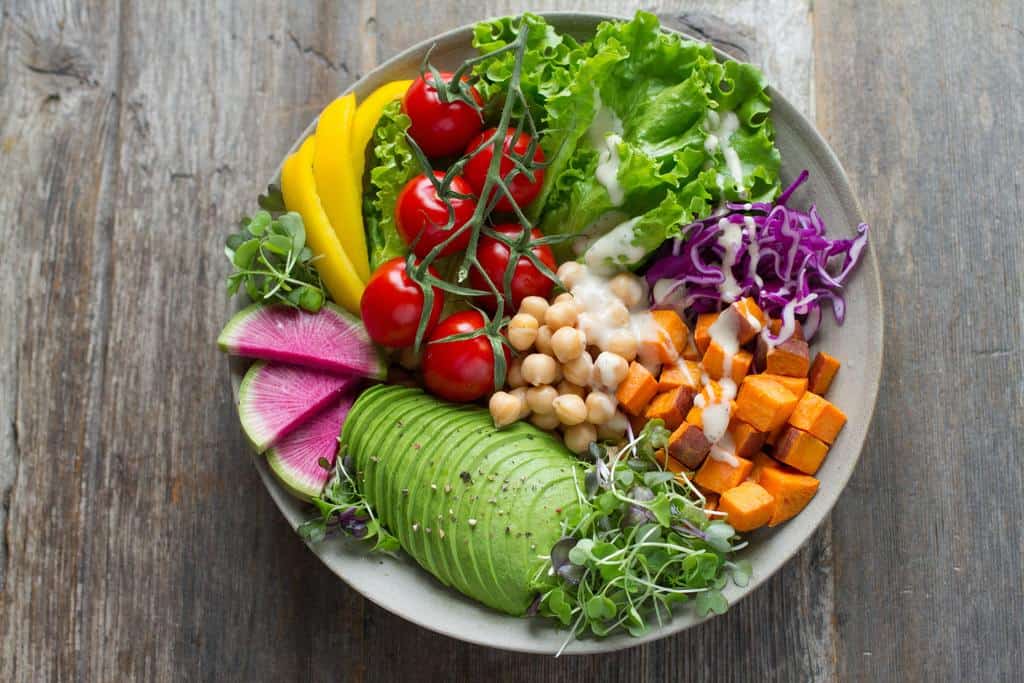 We’re right in the middle of the holiday season, about two weeks before Christmas. That means that this is a time of consuming more sugar and other high-calorie and unhealthy foods. So I thought this was a good time to talk about what it means to “eat healthy”.
We’re right in the middle of the holiday season, about two weeks before Christmas. That means that this is a time of consuming more sugar and other high-calorie and unhealthy foods. So I thought this was a good time to talk about what it means to “eat healthy”.
Before I go on, I want to say that I’m not expecting any of you to want to eat only healthy foods around the holidays, or ever! I know that’s not realistic. But if you can get a general idea of what’s “healthy” and what’s not, then it’s easier to make better choices more often.
I think a lot of people want to do just the opposite and give up any kind of healthy eating around the holidays. They feel like they would rather live it up and just deal with the consequences later. This is exactly why there’s such a surge in gym memberships in January!
I’m a much bigger fan of maintaining healthy habits and consistently eating healthy foods because there are two things I’ve learned from experience:
-
- Eating junk makes you want to eat more junk
- Exercise is already hard so you don’t want to have to work harder later!
So today I want to give you some general eating guidelines to help keep your calories and health under control a little better and not have to pay later.
Avoid processed foods

Processed foods are where we get into a lot of trouble with our eating. Processed basically means anything that’s made in a factory or from unnatural ingredients. They almost always contain more fat, sugar and salt plus things like artificial colors and flavors to make them look and taste good.
Some food dyes have been shown to cause allergic reactions, hyperactivity and other behavioral problems in children. And if it happens to children, do you think adults are unaffected? All those extra ingredients have addicted us to super-sweet and salty foods. This is why we don’t care for natural fruits and veggies much unless they’re eaten with sweet dips or covered in cheese.
What foods have dyes? Pretty donuts, Christmas cookie icing, brightly colored breakfast cereals, toaster pastries, soda pop, candy (M&M’s), etc.
“Most of the ingredients that you should avoid fall into one of three areas: food additives, artificial sweeteners and artificial colors.” This is according to mphprogramslist.com (Masters of Public Health). And one of the many additives this article lists is Sodium Nitrate, which is “added to processed meats to stop bacterial growth”. Unfortunately, it’s also been associated with a higher risk of cancer, heart disease and diabetes.
What are processed meats? Deli meats, sausage, hot dogs, brats, bacon, etc.
So if you want to “eat healthy”, then lowering your intake of processed foods would be a HUGE step in the right direction! And many times, dealing with your moods is a good way to make choosing healthier foods easier.
Related article: How mood affects food choices (and what to do about it).
Eat real food

So what do you do instead? You focus on eating real food, or food in its whole, natural form. Think about substituting something real for something premade with each meal. Try to eat one fruit and one veggie at every meal. Or eat a huge salad at lunch along with some fruit!
If you fill yourself with natural foods first you’ll have less room in your stomach for the unnatural stuff. After a while, you’ll get your taste back for real food and start to enjoy it more! Another idea is to make your own homemade treats so you control the ingredients.
One piece of advice…don’t try to change everything overnight! Just take it day by day, swapping things out a little at a time. You’ll probably never get to an all-natural diet but you can make big improvements with small changes over time. Pretty soon “eating healthy” won’t be that hard, you just need training.
And in contrast to artificial colors, the more colorful fruits and veggies are the more nutrients they contain! Don’t you think we could all use an immune system boost about now?
Related article: Worried about Covid-19?
My practical tips for holiday get-togethers
If you’re going to a holiday party try eating that big green salad and fruit before you go. Then you won’t be so hungry which may make it easier for you to say no to all the extra goodies you’ll be tempted with.
Another tip is to drink a glass of water before eating to help fill up your stomach. It’s also smart to drink a glass of water in-between each alcoholic drink. Besides keeping you sober longer, it’ll help your body not be so overwhelmed trying to process so much alcohol!
Related article: How alcohol affects weight loss.
Cut back on saturated fat

The worst kind of fat to consume is saturated fat. These are fats that are solid at room temperature and are in ALL animal products. But be aware that coconut and palm oils are also saturated fat. Saturated fats raise cholesterol levels (because they contain cholesterol) and clog up the arteries leading to heart disease and other problems.
As a macronutrient that we all need, fat is higher in calories than both carbohydrates and protein. So go easy on it! But if you’ve heard all about how the ketogenic diet is “so great” for health, energy and weight loss then you may feel like tuning me out right now! Instead, check out this short Science Insider video for more specifics on the long-term effects of a keto diet.
One of my favorite researchers, Dr. Michael Greger, has a free website full of helpful information called NutritionFacts.org. If you’re interested in hearing about how saturated fat affects cholesterol negatively then watch the first 2.5 minutes of this video. If you’d like to hear how the meat industry confuses people with their “research” then listen to the entire 8-minute video!
I’m in the middle of reading his book “How Not to Die” right now and I would highly recommend it! He gives details on different diseases and how nutrition affects each of them. I love that he now spends all of his time reading research studies so he can bring the correct information to all of us. And you will get used to, and maybe even learn to love, his way of speaking!
That includes dairy!
We’ve been told our whole lives that dairy products are healthy and necessary for us. But where did that information come from? The American dairy industry, of course! And the government can’t argue because all of their jobs depend on them backing big industry. Here’s a great short video on “How the Dairy Industry Designs Misleading Studies“, also from NutritionFacts.org.
According to pcrm.org “dairy products are the top source of saturated fat in the American diet, contributing to heart disease, type 2 diabetes, and Alzheimer’s disease.” Dairy is also associated with higher risks of certain cancers like breast, ovarian and prostate. Read the details using that last link.
Believe me, I have not completely given up meat and dairy products and I would never tell anyone else they had to. How do you give up cheese forever?! Well, I compromise and just keep my intake very low. Knowing that it not only doesn’t contribute to better health but instead raises my risk of most serious diseases makes it easier for me to avoid it most of the time.
The healthier option
Eat healthy carbohydrates. These are where you get most of the nutrients you need for long-term health, weight management, and a great immune system. That’s why so many other doctors like Joel Fuhrman, Dean Ornish, Neal Barnard, Caldwell Esselstyn Jr. and T. Colin Campbell also advocate for plant-based diets.
Related article: How to lose weight on a plant-based diet.
All of these doctors are focused on nutrition to prevent and reverse diseases. Many of them did so after getting frustrated working in a medical system that never taught prevention or nutrition. I would recommend any of their books but you can also hear most of them speak on Youtube if you’re not a reader.
If you’re a woman that’s had hormonal problems like PMS or bad menopausal symptoms then you might want to read Dr. Neal Barnard’s book “Your Body in Balance“. It’s all about how a plant-based diet (avoiding meat and dairy) can help or eliminate those problems. It also addresses specific problems men face with their health.
Watch the refined sugars and grains
I talked earlier about keeping your processed food intake low. That includes sugar and flour. They’re also known as refined foods. They don’t exist in nature, they have to be “processed” or “refined” from their natural forms. And they are NOT generally healthy foods. Some of them include:
-
- cookies, cakes, pastries, pies, quick breads, bagels or muffins
- breakfast cereals
- pancakes or waffles
- caramels or fudge
- premade microwavable meals
- cheese and crackers
Again, I haven’t given up sugar or flour and I wouldn’t expect anyone else to either. But the logical choice is to cut down and look for more natural sweets instead. And like I said, fruits and veggies would taste better to us if we weren’t so addicted to sugar, salt and fat.
What I’ve learned over the years is that the more sugar we eat the more we want to eat. You may notice after the holidays that it’s hard to go back to “normal” eating because we got used to all those “special” treats for over a month!
My final thoughts
If you’re generally healthy and your weight is under control, you might just want to live it up for the holidays and other special occasions. If that’s the case, go right ahead! Your strategy might be to eat your junk during these times but eat healthy the rest of the time.
You will be taking in extra calories though so you just might have to do a little more exercise to work them off. But that can work for some people. I do a little better with more consistency in my habits. I know I gain weight easily when I don’t eat healthy and I prefer not to yo-yo in pounds.
There’s also the mental aspect of binging for a while then trying to get back on track later that I find hard to manage. Like I said earlier, eating junk just makes me want to eat more junk! So for me, sticking to a more consistent routine is easier. You have to find whatever works best for your long-term health.
Either way, you don’t have to spend your holiday or the new year counting calories or swearing off carbs. Just eat more real food – load up on fruits, veggies and greens first – and avoid saturated fats and dairy products. That way you won’t have to worry about the weight so much and you’ll probably feel a lot better!

